Introduction
Did you know that duck hunters in Florida have a higher success rate than those in any other state in the Atlantic Flyway? There are many varieties of waterfowl in Florida, which reach across large portions of the state. However, there are certain regulations and limits that hunters should follow before, during, and after the hunt. These restrictions and regulations ensure the management of the duck populations and that more hunting opportunities become available in the future. After all, conservation is key to providing a healthy duck population for the hunt.
Duck Hunting Season Dates in Florida
Duck hunting season in Florida begins on November 19th and lasts until November 27th. It begins again on December 10th and lasts through January 29th. Waterfowl dates for veterans, active-duty military, and youth accompanied by an adult are February 4th and 5th in Florida.
Daily Bag Limits
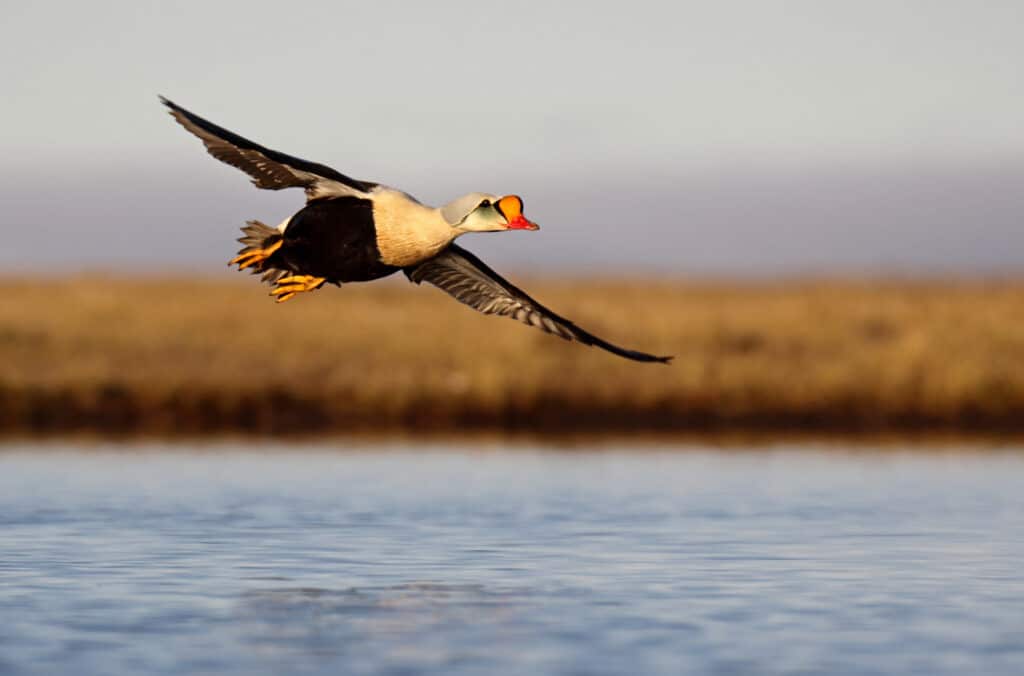
Daily bag limits for duck hunting in Florida amount to six total.
©Agami Photo Agency/Shutterstock.com
Daily bag limits for duck hunting in Florida amount to six total. Of these six, a hunter can shoot no more than one Pintail, one Mottled Duck, one Fulvous Whistling Duck, two Mallards (no more than one female), two Redheads, two Black Ducks, two Canvasbacks, three Wood Ducks, and four Sea Ducks (no more than one female Eider and no more than three Scoters, Long-tailed Ducks, or Eiders).
Possession Limits
Possession limits are three times the daily bag limit. Therefore, possession limits in Florida amount to 18 ducks total.
Florida Waterfowl Regulations
Following waterfowl hunting regulations is key to stabilizing duck populations and providing hunting opportunities in the future. Below list just some of the many regulations adhere to when hunting ducks in Florida.
- Shooting hours begin 30 minutes before sunrise and end at sunset.
- Hunters need a Migratory Bird Permit, a valid hunting license, a Florida Waterfowl Permit, and a Federal Duck Stamp.
- Certain counties permit waterfowl hunting on certain days. For instance, Leon County and Lake Miccosukee have restricted waterfowl hunting to Wednesdays, Saturdays, and Sundays during the duck hunting season dates. However, those in Leon County and Lake Miccosukee are allowed to hunt on November 24th and 25th and on January 16th. Other regulations concerning boat motor restrictions and duck blinds in Leon County and Lake Miccosukee can be found online.
- Ducks should be tagged prior to storage, transportation, transition of custody, shipping, processing, or taxidermy.
- Hunters should submit a report online if they shoot a banded duck.
- We recommend free hunter education for new or novice hunters.
Hunter Safety
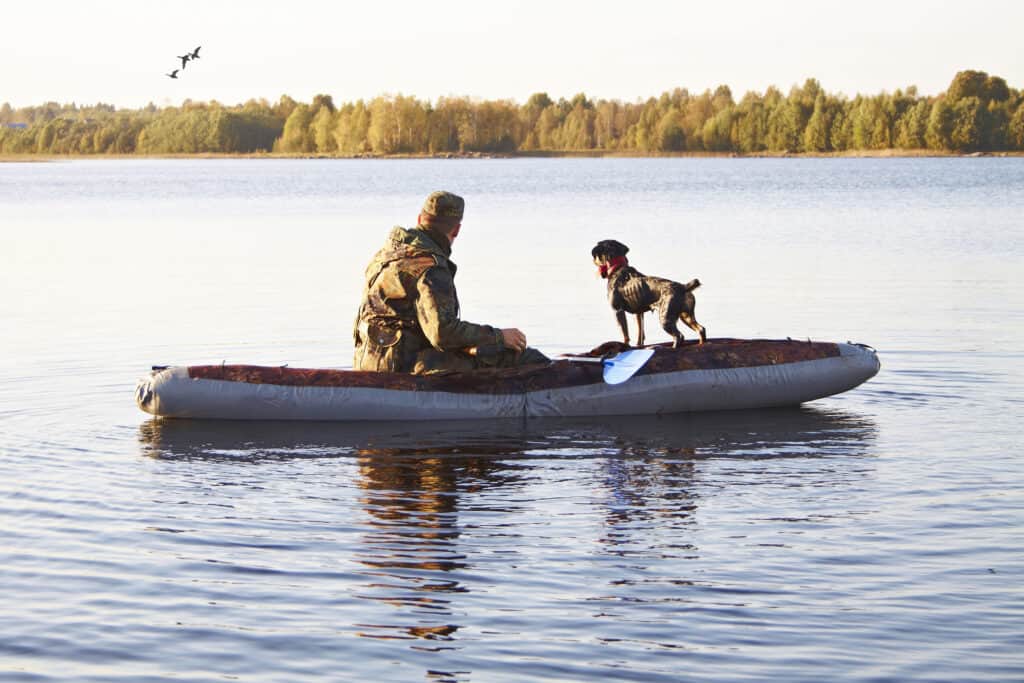
Hunters that use boats should follow all regulations and be conscious of risks associated with using boats while hunting.
©Moroz Elena/Shutterstock.com
Follow all regulations for hunters using boats and be conscious of risks with using boats while hunting. For instance, hunters should bring life jackets in their boat in case the boat turns over in deep water. Life vests come in many styles, including camouflage, which will not interfere with a hunter’s ability to blend into their surroundings. Wear life vests on the outside of a hunter’s clothing, not underneath.
Hunters over the age of 16 must complete a hunter safety course before hunting in Florida. Without taking this course, they will not be able to receive a hunting license and will be hunting illegally. Those who have not completed the course must hunt with someone over the age of 21. Hunters who were born before June 1, 1975 do not need to complete the hunter safety course to receive a hunting license.
Prior to hunting, carry shotguns in a gun case. They must not be loaded, and the safety should be on. Hunters should not point their shotgun toward another person or in any direction that may cause harm to someone else or themselves. They should know where their target is and what is behind their target. Hunters should not touch the trigger until they are ready to shoot a duck. They should also act as if every shotgun they carry is already loaded, being extra cautious when carrying firearms.
Public versus Private Land
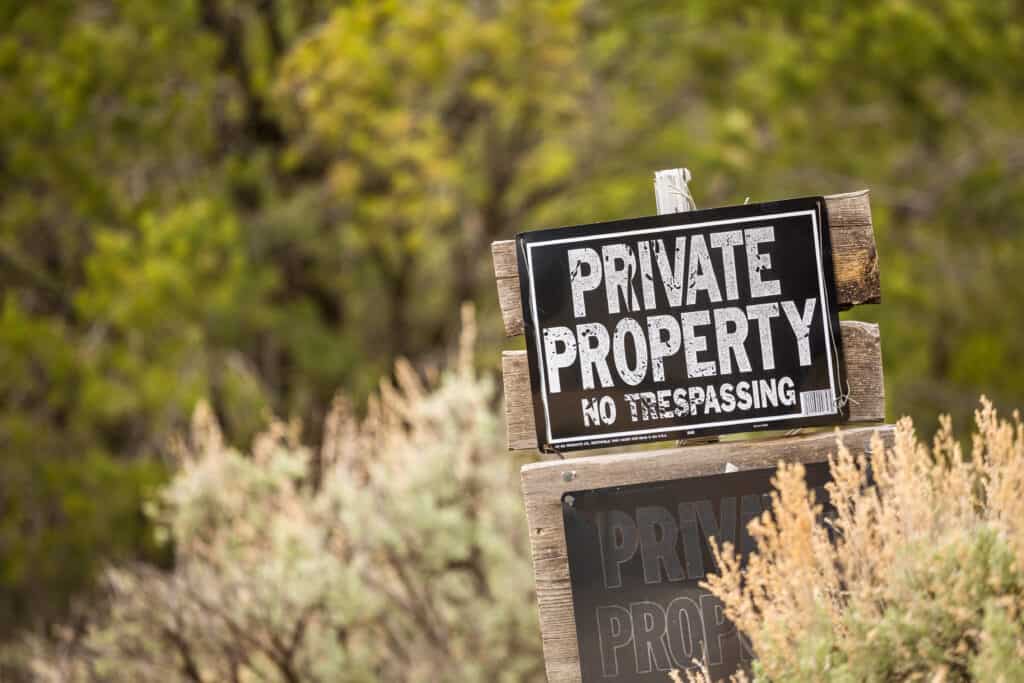
A hunter must always ask permission first to avoid trespassing on private land.
©sopotnicki/Shutterstock.com
Hunters can take advantage of hunting on private land so long as they have received permission from the property owner or owners. Public lands are available for hunting, too. However, some public areas have bodies of water that prohibit hunting, so it is crucial to research and understand which areas are within limits. Public areas that allow hunting include Wildlife Management Areas, Water Management District lands, and National Wildlife Refuges. A hunter should determine the required permits for hunting on these lands and what regulations and restrictions apply to such areas before beginning a duck hunt.
One example of a public hunting area in Florida is Lake Seminole. Lake Seminole is in Jackson County, and the Georgia/Florida border passes through the area. In this case, hunters with a Florida hunting license should only hunt on the Florida side of the lake. At Lake Seminole, a hunter can find Ring-Necked Ducks, Canvasbacks, and Wood Ducks.
Hunting Necessities
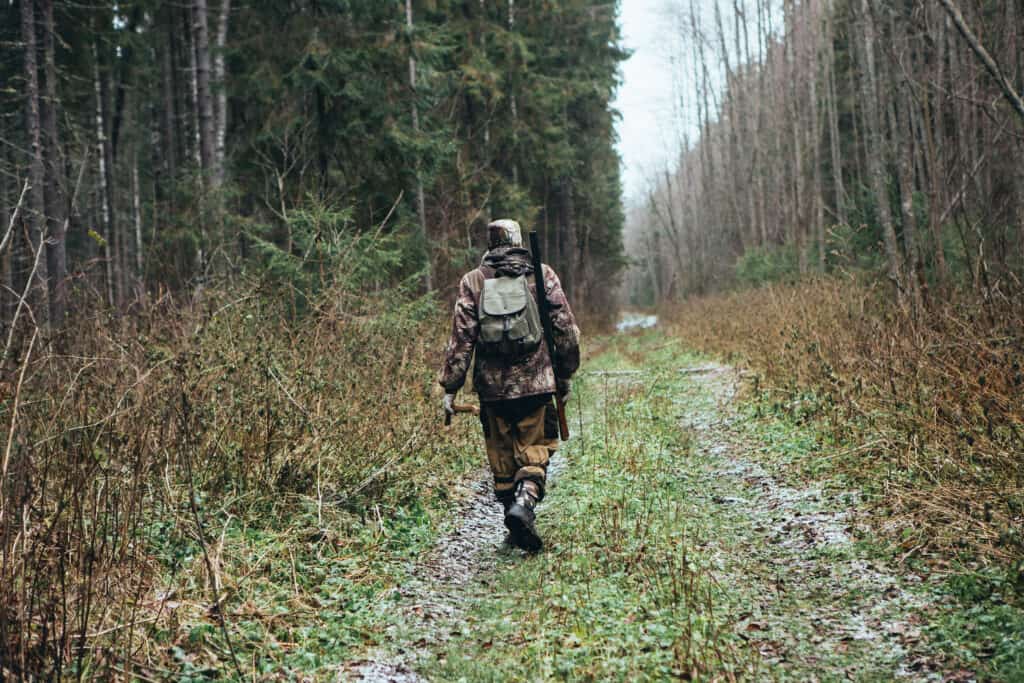
Duck hunting has a reputation for being gear heavy, but it doesn’t have to be.
©Scharfsin/Shutterstock.com
Hunters should wear camouflage head to toe to conceal themselves from the ducks. The camouflage should adequately blend into the surrounding environment. Therefore, doing proper research beforehand on what the hunting area looks like is crucial to a successful hunt. Layering will keep a hunter warm while the sun is down, and waders will keep them dry if they choose to go into the water.
Pre-recorded duck calls are not permissible when hunting. Duck calls must be manual, meaning they should be physical duck calls that a hunter can blow into to call a duck. Duck calls in Florida do not have the highest success rate, though. They can be helpful but are not entirely necessary to a successful hunt. In fact, excess use of a duck call may have the opposite effect; ducks will retreat from the area, rather than advancing toward the hunter. On the other hand, you can use duck decoys in Florida, and they are helpful in attracting ducks.
Scouting
Scouting before a hunt can dramatically improve the chances of success later on. For example, a hunter should arrive to a body of water or other hunting area at sunrise to observe duck behavior and feeding patterns. Ducks who remain uninterrupted by scouts will likely come back to the same area when the hunter returns to shoot.
Environment
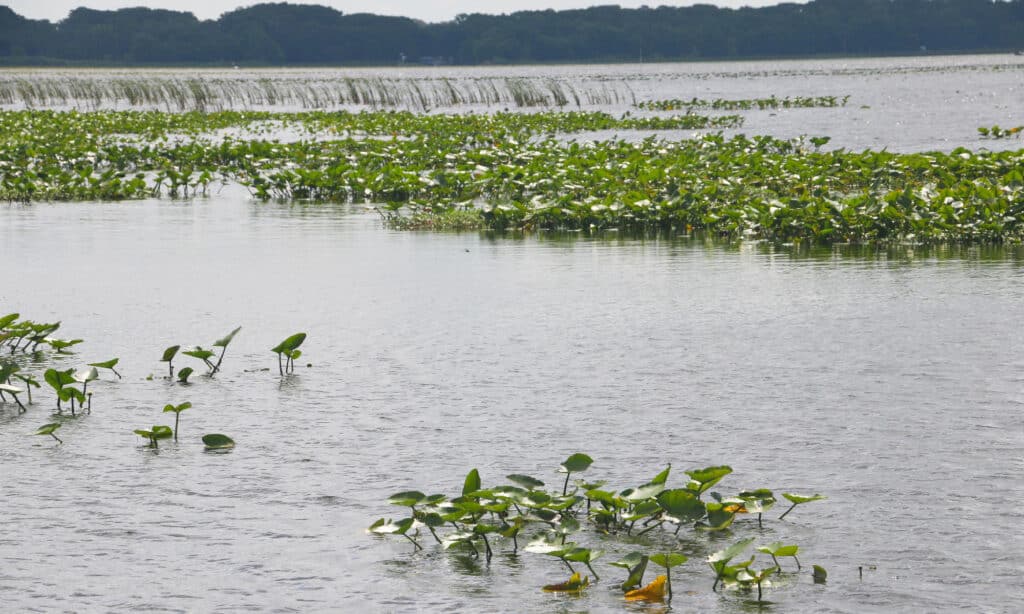
Ducks mainly reside in moisture-dense areas like
wetlands
, ponds, and marshes.
©iStock.com/Warren-Pender
Ducks mainly reside in moisture-dense areas like wetlands, ponds, and marshes. In Florida, the native plant hydrilla is a popular choice among ducks for food. Hunters who search for hydrilla are likely to find ducks nearby. Other plants that grow to the water’s surface attract ducks, too. A hunter that looks for large mats of various types of plants will be successful in locating a variety of duck species. Do not assume that because ducks are not near these plants, they will come use the area later. It is a waste of time to believe that the ducks will eventually arrive. When scouting, find an area where ducks are visible before determining where a hunt will take place.
Identifying Duck Species
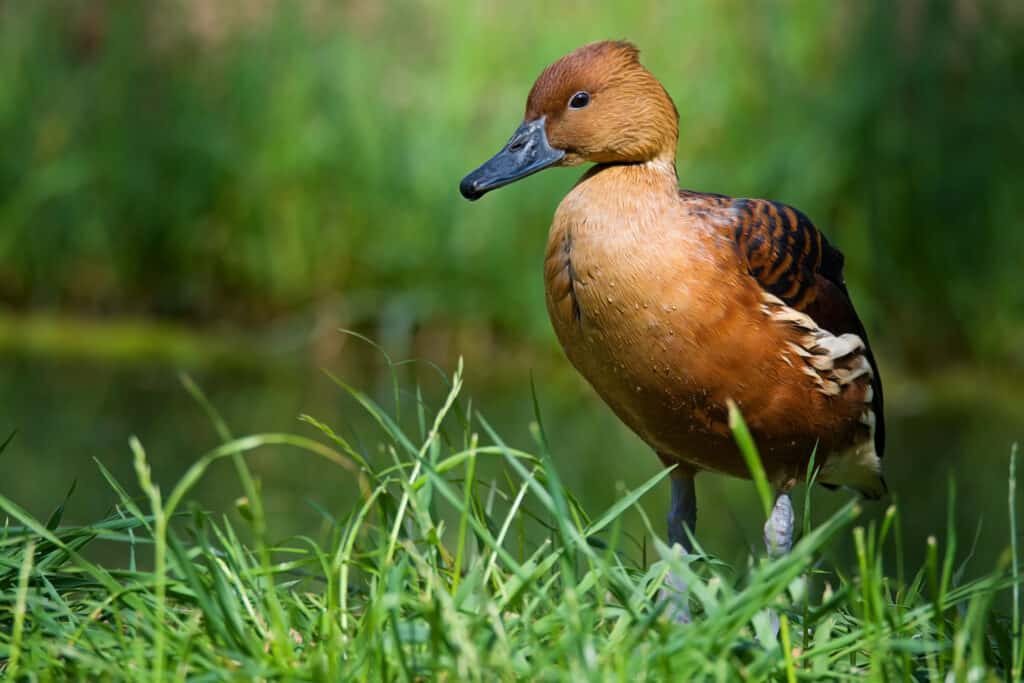
A hunter should be well educated on the physical appearance of each species to ensure that they are following state regulations.
©Ondrej Chvatal/Shutterstock.com
Before hunting, research duck species’ appearances. There are a multitude of duck species that reside in Florida. At the same time, there are various rules that apply to bag limits of each species. Therefore, a hunter should be well educated on the physical appearance of each species to ensure that they are following state regulations. In addition, a hunter should try to identify certain species when scouting. This way, the hunter can be sure that they are knowledgeable about each kind of duck and, in turn, can hunt responsibly.
Tips for Hunting Ducks in Florida
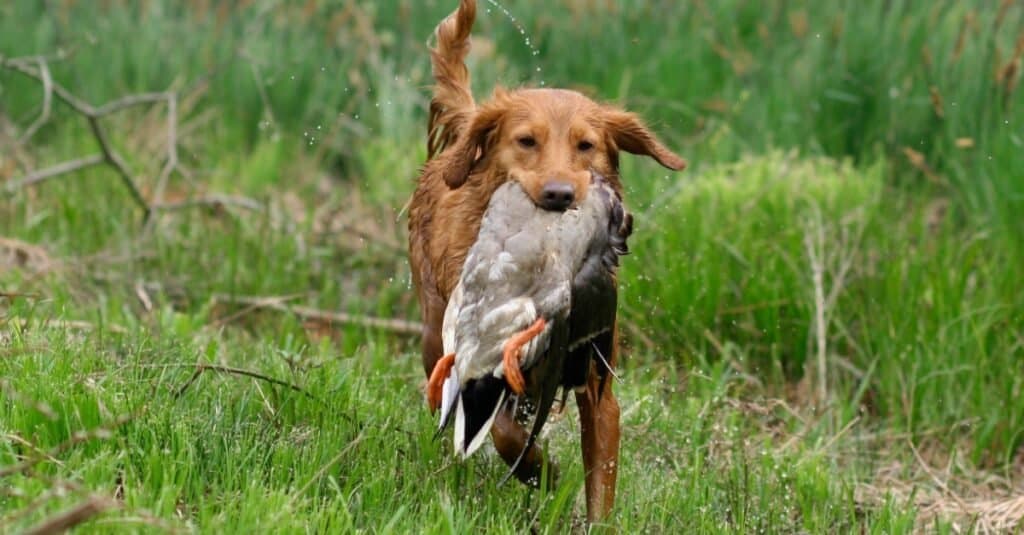
Dogs
can be extremely helpful on the hunt, as they are able to retrieve ducks effectively.
©iStock.com/Azoogle
Duck hunting can be a difficult task, especially when a hunter is just starting out. Some helpful tips and advice for hunting ducks in Florida are listed below.
- Ducks have incredible eyesight, so proper camouflage is crucial. In addition, a hunter should be very still when ducks advance within range.
- When using decoys, a hunter should arrange them in a way that imitates what the ducks are doing at the time.
- Hunting with the wind blowing from behind the hunter on their back will increase the chances that a duck lands within range.
- Firearms should be shot from no more than approximately 40 yards away, and hunters should determine which duck will be their target before shooting.
- Practicing at a shooting range before hunting will help improve a hunter’s skill and make their shots more ethical in killing ducks. Practice decreases the chance that a hunter will wound a duck without being able to recover it.
- Dogs can be extremely helpful on the hunt, as they are able to retrieve ducks effectively.
Up Next
The photo featured at the top of this post is © Jeremy A. Casado/Shutterstock.com
Sources
- Florida Fish and Wildlife Conservation Commission, Available here: https://www.eregulations.com/assets/docs/guides/22FLHD_LR.pdf
- Florida Fish and Wildlife Conservation Commission, Available here: https://myfwc.com/hunting/waterfowl/hunt-guide/
FAQs (Frequently Asked Questions)
Can you duck hunt in Florida?
You can duck hunt in Florida with the correct licensure and permits. Hunters should also follow all state regulations.
When does duck hunting season start in Florida?
Duck hunting season in Florida begins on November 19th and lasts until November 27th. It begins again on December 10th and lasts through January 29th. Waterfowl dates for veterans, active-duty military, and youth accompanied by an adult are February 4th and 5th in Florida.
How should someone prepare for duck hunting season in Florida?
A hunter should acquire all necessary licensure, clothing, firearms, and other materials. They should practice at a shooting range, scout out the future hunting area, and be able to identify a variety of duck species beforehand.
Thank you for reading! Have some feedback for us? Contact the AZ Animals editorial team.






